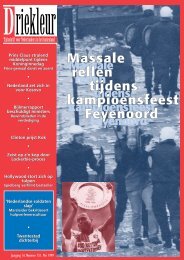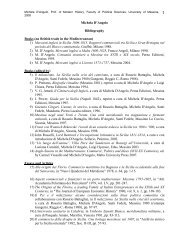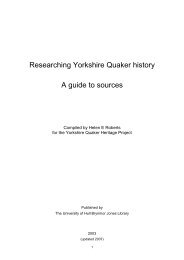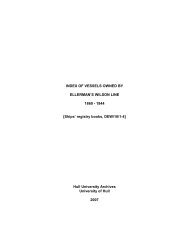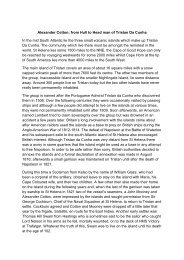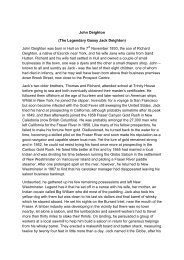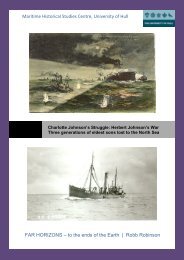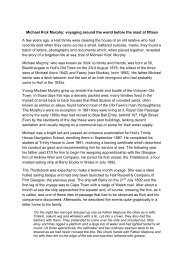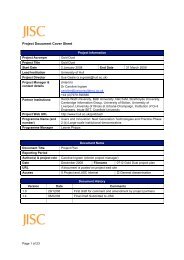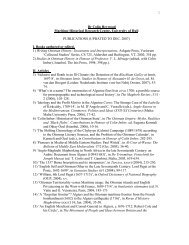The North Atlantic Fisheries, 1100-1976 - University of Hull
The North Atlantic Fisheries, 1100-1976 - University of Hull
The North Atlantic Fisheries, 1100-1976 - University of Hull
You also want an ePaper? Increase the reach of your titles
YUMPU automatically turns print PDFs into web optimized ePapers that Google loves.
Västkustfisket. Dess organisationer och ekonomi (organization and<br />
economy) (Göteborg, 1960).<br />
Concluding Remarks on Literature and Sources<br />
<strong>The</strong> references above to literature and sources are examples from a wide<br />
range <strong>of</strong> both primary and secondary material. A more complete register<br />
is available in printed form as a result <strong>of</strong> the work done within the<br />
research project ‘Sydsvenska kustmiljöer’ in the Department <strong>of</strong><br />
Ethnology and Economic History, <strong>University</strong> <strong>of</strong> Lund: T.<br />
Hedlund-Nyström, Svenskt havsfiske. En bibliografi, (Swedish Salt<br />
Water Fishery. A Bibliography) I, II (Lund, 1982). <strong>The</strong> collection is<br />
national, but all titles are labelled with a county mark—O for the county<br />
<strong>of</strong> Göteborg and Bohuslän. <strong>The</strong> bibliography includes material up to<br />
c1980.<br />
Finally, one modern study is worth mentioning because <strong>of</strong> its<br />
topic—Swedish whaling. K. Awebro, En lång väg till Arktis - forskning<br />
kring svensk valfångst, a paper presented at a seminar ‘Nye studier i<br />
Svalbards historie’ on June 17 1994, the <strong>University</strong> <strong>of</strong> Trondheim,<br />
Centre for Environment and Development. Unit - SMU. Rapport nr 2/95.<br />
Proposals for further research<br />
<strong>The</strong>re is not a comprehensive ‘History <strong>of</strong> Swedish <strong>Fisheries</strong>’ nor even a<br />
history <strong>of</strong> the fisheries on the west coast <strong>of</strong> Sweden. <strong>The</strong> eighteenth<br />
century herring fishery has had its interpreters, but still there is a lot to<br />
do. How was the catching organized? What was the real character <strong>of</strong> the<br />
units in work? How were the labour force in the salting houses and<br />
train-oil factories recruited and paid? Who were the merchants who<br />
organized and financed production and trade? Where did the money<br />
come from?<br />
For more modern periods there are wide fields for research.<br />
Important themes are: studies <strong>of</strong> catches, boats and equipments over<br />
time, effects <strong>of</strong> regulations <strong>of</strong> fishing waters and size <strong>of</strong> catches, access<br />
to capital, governmental control, regulation and support <strong>of</strong> the fishing<br />
industry, the causes and consequences <strong>of</strong> west coast fishermen going into<br />
the Baltic, the market for fish—domestic and international, Preserving<br />
the products—the modern factories and canneries, studies <strong>of</strong> consumer<br />
habits, etc.<br />
174



